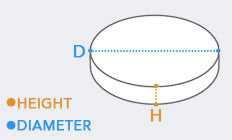
Neodymium Disc Magnet Product Description:
This Neodymium Rare Earth Disc Magnet has a diameter of 20mm and a height of 4mm. It has a magnetic flux reading of 2451 Gauss and a strong magnetic pull force of 6.16kg. It is identified by the AMF Magnetics part number 20016.
Uses for our Rare Earth Disc Magnets:
This 20mm x 4mm Rare Earth Magnetic Disc is one of our most popular products. The size and strength of this permanent magnet make it an incredibly versatile product.
Smaller sized discs such as this make great closure devices when stitched or seamed into fabric, shade cloth, insulation, curtains. These discs can be inserted inside a seam and coupled with another magnet or steel to create a secure closure. Neodymium Rare Earth Magnets have also been adopted by fashion designers to hold complex and voluminous fabric arrangements in place on the catwalk. If you have ever wondered how those bizarre high fashion outfits are held in check, magnets are the solution.
They are also used for many industrial and manufacturing applications such as metal separation, pharmaceutical stirrers, metal detectors, tool holders, clamps, and metal and stud finders.










